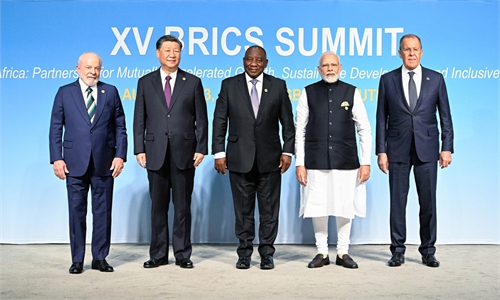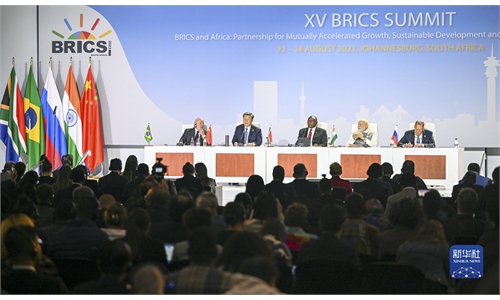With major oil exporters joining BRICS, local currency settlements rather than US dollar become more natural: analysts

BRICS Photo:VCG
With Iran, Saudi Arabia and the United Arab Emirates joining BRICS, the multilateral mechanism now includes major global oil producers and importers. Analysts said that a wider adoption of local currencies for trade among BRICS countries, rather than using the US dollar, seems more natural.
Six candidates - Argentina, Egypt, Ethiopia, Iran, Saudi Arabia and the United Arab Emirates - will be admitted as BRICS members on January 1, 2024, South African president announced on Thursday at the BRICS summit. Currently, BRICS members include Brazil, Russia, India, China and South Africa.
A Shanghai-based oil industry insider told the Global Times on Friday on the condition of anonymity that having oil producers and consumers as members will set a foundation for BRICS members to use local currencies in settlement, which can definitely reduce transaction costs, adding that people are witnessing the twilight of the petrodollar.
As of August, the countries that have expressed interest in joining the BRICS account for 60 percent of the world's known oil and gas reserves, according to media reports.
"If you take into account the other trading blocs in which each of the current five BRICS countries are members, as well as the countries that are willing to join BRICS, it is enough to build an independent transnational monetary system. It means that more international oil trade can break the stranglehold of the petrodollar by using local currency settlement," the insider said.
BRICS leaders stressed the importance of encouraging the use of local currencies in international trade and financial transactions between BRICS countries as well as their trading partners, and encouraging the strengthening of correspondent banking networks between BRICS countries and enabling settlements in local currencies, according to a declaration released during the three-day 15th BRICS summit ended on Thursday.
So far, the volume of transactions within BRICS using US dollars and euros has continued to decline, open data showed.
The insider stressed that when oil and other commodities are traded directly in non-dollar currencies, the function of US Treasury bonds as foreign exchange reserves will be irreversibly weakened, as oil, the most important energy commodity traded, has always been linked to the status of the global reserve currency.
"The selling of US dollars and US Treasuries will be accelerated," the insider noted.
In fact, a trend of reducing holdings of US Treasuries has gradually emerged.
Saudi Arabia's holdings of US Treasuries fell to a six-year low to $108.1 billion in June. The cumulative net selling of US debt is nearly $80 billion. UAE also sold nearly $4 billion US debt in total, according to data from the US Department of Treasury.
Analysts noted that the de-dollarization trend is actually the bitter fruit of the US' own making. In recent years, the US' successive unilateral financial sanctions have reminded more and more countries of the necessity and urgency for de-dollarization, which has now become a general consensus.
Meanwhile, the US dollar has long been propped up by global trust in US debt. But the US has damaged the rest of the world's economy through unlimited quantitative easing and sharp and massive interest rate hikes. It should be said that the US is overdrawing on the credit of the US dollar, a director surnamed Wang of a Beijing-based securities company told the Global Times on Friday.
"In the past, there was probably no better alternative to the US dollar, and the strong economic power of the US allowed the dollar to continue to maintain its hegemony. Now things have changed. For example, the New Development Bank of BRICS offers a local currency settlement environment to reduce the cost and complexity of cross-border trade," said Wang.
Wang also noted that the status of the dollar is affected by political and economic instability in the US. The high level of US government debt and uncertainty over the growth of the US economy will lead to a decline in the value of the dollar. It's natural that other countries want to reduce their dependence on the dollar to reduce that risk.



